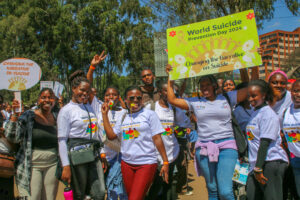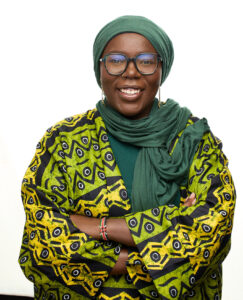On November 8th, 2024, I lost a dear colleague, Charity Muturi, to suicide. The initial news reached me through social media, where a post reported an “unidentified woman” had died by suicide. The way the post was framed perpetuated harmful stereotypes and stigmas that society often attaches to suicide. As someone who has tirelessly advocated for ethical media reporting on mental health issues, including suicide, I found myself frustrated and deeply saddened. The language used in public discourse and the media matters immensely, not only in shaping public perception but also in determining whether we perpetuate stigma or foster compassion and understanding.
As mental health advocates, we’ve worked hard to encourage the use of appropriate language—language that respects the dignity of those affected by suicide. For instance, we avoid phrases like “committed suicide” or “successful suicide,” as they carry connotations of crime or moral failing. Instead, we say “died by suicide,” which acknowledges the understanding that suicide is often the tragic outcome of mental health struggles rather than a moral failing. Suicide is not a sin, nor is it a crime—at least, not anymore in Kenya, thanks to the work of activists who have struggled over the years to realise the recent decriminalization. This shift in language reflects a broader cultural transition toward treating suicide as a public health issue rather than a moral or criminal one. Words are powerful. They can humanize or ostracize. They can heal or harm.
The news hit me hard when I logged into a WhatsApp group and discovered that the “unidentified woman” in the report was Charity—a friend I deeply respected. Charity and I worked on the technical working committee for Nairobi County’s mental health action group. While I represented marginalized communities, Charity was a powerful voice for individuals with lived experiences of mental health challenges. Her passing left me shattered. Charity courageously shared her journey of battling suicidal thoughts since the age of 14 and her diagnosis of bipolar disorder in 2015. Despite her struggles, she fought tirelessly for systemic change. In 2018, her doctor made the compassionate decision not to report her suicidal ideation to the authorities, a choice that underscored the tension between outdated laws and ethical care—an issue Charity passionately worked to address.
She was also a key petitioner in the historic case to decriminalize suicide—a hearing initially scheduled for November 20, 2024, just two weeks after her tragic passing, which was then rescheduled to January 9, 2025. Her story serves as a powerful reminder of why criminalizing suicide is unjust and counterproductive. Sometimes, we believe that suicide only happens to other people, far removed from our own lives, until it hits home. Like other mental health conditions, none of us is immune. Charity’s life and advocacy are a call to action for us all to confront stigma, offer support, and work toward a compassionate mental health system.
Globally, suicide is a significant public health concern. According to the World Health Organization (WHO), more than 700,000 people die by suicide annually, with over 70% of these deaths occurring in low- and middle-income countries (WHO, 2021). Despite its prevalence, data on suicide in these regions, including Kenya, remains limited. One major challenge is the fragmented nature of reporting systems for suicide mortality. In Kenya, distinguishing cases of intentional self-harm from accidents or homicides is particularly difficult, and even when data is recorded, it is often incomplete. For instance, information on the method of suicide is frequently missing. This underscores the urgent need for systematic and standardized suicide reporting practices.

According to the World Health Organization (WHO), Kenya has about 6.1 suicide deaths for every 100,000 people, with around 11 deaths per 100,000 when adjusted for age. This means that roughly four people in Kenya die by suicide each day. (Kenya Suicide Prevention Strategy, 2021-2026). Suicide often results from a convergence of multiple factors, including genetic, biological, psychological, socioeconomic, cultural, and other risks. While there is a well-established link between suicide and mental health conditions, many suicides occur impulsively during moments of crisis. These crises often involve an inability to cope with life stresses such as financial difficulties, relationship breakdowns, chronic pain, or illness. Additionally, certain groups are more vulnerable to suicidal behavior, further emphasizing the need for targeted interventions and prevention strategies.
The criminalization of suicide in Kenya, like in many other former British colonies, is a remnant of colonial rule. These archaic laws, imposed by European colonial powers, treated suicide as a criminal act rather than a mental health issue. Such legislation ignored local contexts, instead focusing on punitive measures for individuals needing care and support . For instance, the criminalization of suicide was often intended to prevent enslaved individuals from attempting suicide as an act of resistance or freedom. Colonial laws not only ignored the realities of mental health in African communities but actively weaponized mental illness as a tool of control. For example, in Uganda, the Mental Treatment Act has historically been used to marginalize and silence those who think differently or challenge dominant systems of power. Mental health labels were (and sometimes still are) exploited to exclude, punish, and oppress dissenting voices and marginalized communities.
In a landmark ruling on Decriminalization of Suicide in Kenya, Justice Lawrence Mugambi declared Section 226 of the Kenyan Penal Code unconstitutional. This section, which punished individuals for “attempting suicide” with up to two years in prison, was found to violate constitutional guarantees of dignity, equality, and the right to the highest attainable standard of health. Justice Mugambi’s decision marked a significant victory for mental health advocates, affirming that suicide is a mental health issue, not a crime. However, decriminalization does not automatically equate to destigmatization. The more challenging work lies ahead—changing societal attitudes, improving public perceptions, and ensuring that survivors of suicide attempts are treated with dignity and compassion.

As we await the full implementation of the court’s decision, it is imperative to ensure that Kenya’s National Suicide Prevention Strategy (2021–2027) is actively enforced. This strategy advocates for a human-rights-centered approach, integrating mental healthcare into primary healthcare systems and ensuring accessible, affordable, and comprehensive support for all. Community-based interventions, such as peer support groups, are also vital. My friend Nadra Alley, diagnosed with bipolar disorder, founded Safe Haven Wellness in Kenya—a space where individuals with suicidal ideation or attempts can share experiences and support one another in confidence. Initiatives like these highlight the power of community and lived experience in addressing suicide.
In Kenya, cultural and religious beliefs often exacerbate the stigma around suicide. In highly religious communities, those who die by suicide are frequently denied burial rites, further marginalizing grieving families. This cultural context complicates data collection, leaving us with an incomplete understanding of the true scope of the issue. It’s difficult to advocate effectively for resources and policy changes without accurate data. This underscores the importance of collaborative efforts between legal, medical, and community stakeholders to address the systemic and cultural barriers that perpetuate silence and stigma. In Kenya, since the beginning of the Gen Z protest in early 2024, it has been increasingly challenging to identify causes of death due to the rise in femicides, suicides, and the abduction, torture, and killing of government critics.
The work ahead is daunting but necessary. Media professionals must be trained to report on suicide ethically, using language and framing that prevent harm and encourage help-seeking behavior. Societal attitudes must shift to view suicide through a lens of compassion rather than condemnation. Legal practitioners and mental health professionals must collaborate to address the needs of those previously criminalized for suicide attempts, ensuring they receive the support they need to rebuild their lives.
The decriminalization of suicide in Kenya is a great step towards justice that many other African nations could follow to reform their laws and policies. Suicide is not a criminal justice issue; it is a matter of health justice. However, the journey toward justice must also include reflection. How do we address the harm caused by these archaic laws? Is it enough to forge ahead, or must we also acknowledge and reconcile with the past? Can we decolonize mental health and our understanding of suicide?
We must then invest the right resources in shifting narratives imposed by colonial legacies to ones rooted in our cultural contexts and compassion.
A gendered and feminist lens is essential in addressing suicide, as it intersects with societal norms, expectations, and structural inequalities. Women often face pressures such as gender-based violence, economic dependency, and societal role expectations, which exacerbate mental health struggles (UN Women, 2023). Men, constrained by harmful masculinity norms that discourage emotional vulnerability and seeking help, experience higher rates of completed suicides globally (WHO, 2021). Additionally, queer individuals are particularly vulnerable due to discrimination, social exclusion, family rejection, and violence, with LGBTQ+ youth being over four times as likely to attempt suicide compared to their heterosexual and cisgender peers (The Trevor Project, 2022). Addressing these issues requires inclusive and equitable prevention strategies that decolonize research by integrating diverse lived experiences and challenging power structures. Tailored interventions—such as programs addressing masculinity norms, providing safe spaces for queer individuals, and empowering women economically and socially—are critical for creating effective and holistic solutions.
 Amisa Rashid is a renowned mental health practitioner, neuropsychologist, and mental health advocate, celebrated for her innovative contributions to mental health care in Africa. As the Founder and Executive Director of the Nivishe Foundation, she has spearheaded culturally sensitive, non-discriminative mental health interventions for underserved and marginalized communities. She is keen on Decolonizing and Africanizing mental health.
Amisa Rashid is a renowned mental health practitioner, neuropsychologist, and mental health advocate, celebrated for her innovative contributions to mental health care in Africa. As the Founder and Executive Director of the Nivishe Foundation, she has spearheaded culturally sensitive, non-discriminative mental health interventions for underserved and marginalized communities. She is keen on Decolonizing and Africanizing mental health.
